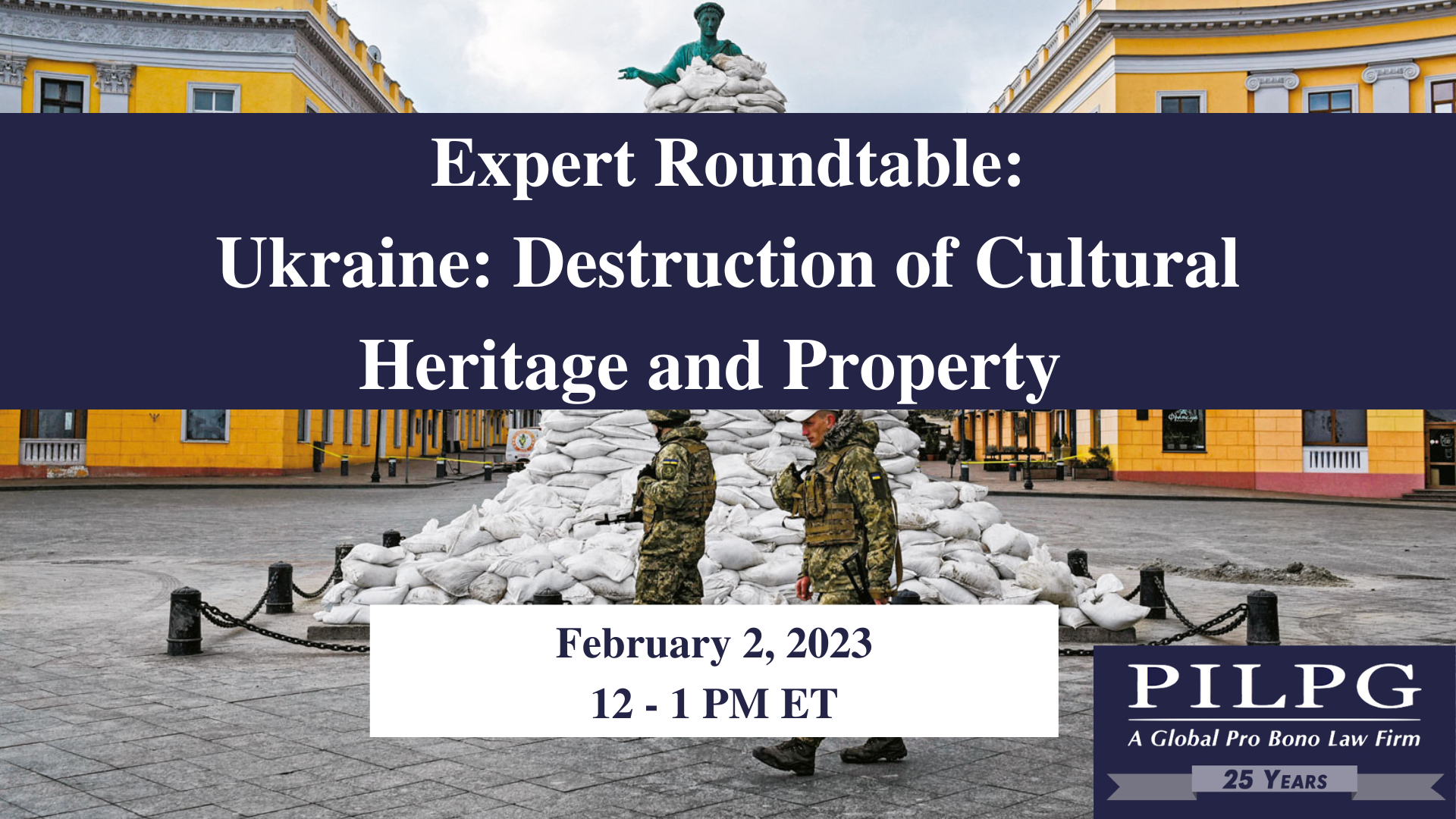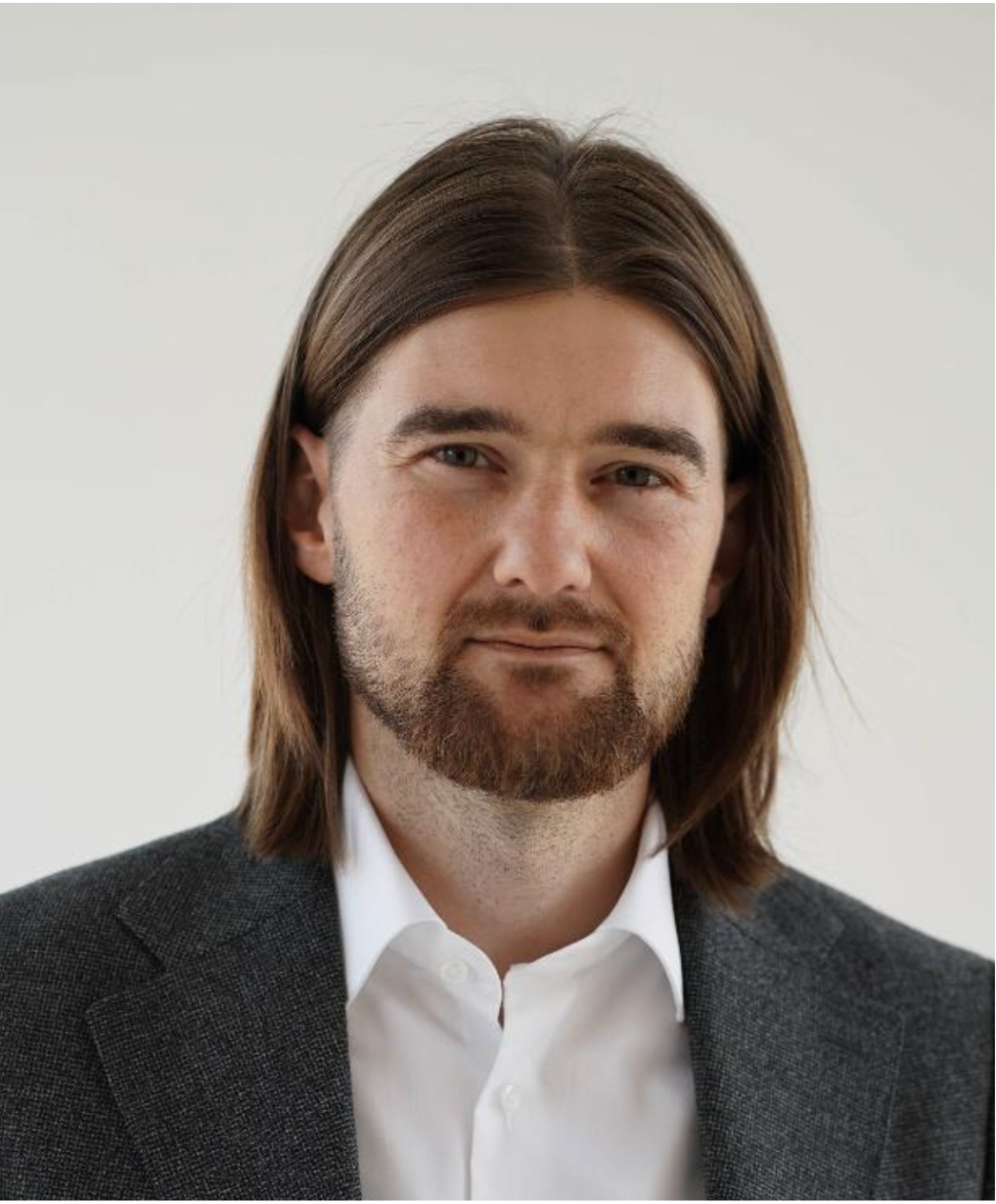Expert Roundtable:
Ukraine: Destruction of Cultural Heritage and Property
Event Description
Join PILPG on February 2 from 12 pm to 1 pm ET for a conversation with experts regarding the destruction of cultural heritage and property in Ukraine as a consequence of the Russian invasion of Ukraine.
As of mid-January 2023, UNESCO had verified damage to 236 cultural sites in Ukraine since February 24, 2022, including religious sites, museums and monuments. Ukrainian cultural heritage and property in regions occupied by Russia have suffered immensely, with statistics finding up to 90% of historical buildings and cultural infrastructure in some areas destroyed.
During this event our panelists will provide background to the destruction of cultural heritage and property, both within international law more widely and in the Ukraine context specifically. Our panelists will discuss the situation on the ground in Ukraine concerning the destruction of cultural property, Ukraine and international organizations’ ongoing efforts to catalog the damage, as well as the possibilities for prosecution and possible mechanisms for the return of stolen property. This event will be moderated by PILPG Managing Director Milena Sterio.
This is part of the PILPG Thought Leadership Initiative. The Initiative focuses on prominent international law and international affairs topics and organizes monthly expert roundtables to share expertise and reflections from our work on peace negotiations, post-conflict constitution drafting, and war crimes prosecution.
Speakers
Kristin Hausler
Kristin Hausler is the Dorset Senior Fellow and Director of the Centre for International Law. Since joining the Institute in 2007, she has developed and led several research projects on international human rights law, international humanitarian law, and international criminal law, areas in which she also provides training at the Institute. Her most recent projects focused on cultural heritage protection, in particular in situations of conflicts. Currently, she is leading a project on the restitution of cultural objects, which is funded by the Leverhulme Trust, as well as a project analyzing the role of intangible cultural heritage in strengthening climate resilience, in cooperation with the Institute of Small and Micro States and the Konrad Adenauer Stiftung.
Kristin has worked as a consultant on cultural heritage, such as to review legislative reform in post-conflict contexts. She has also spoken at events around the world, including at the United Nations, and is regularly invited to teach on cultural heritage, such as at the University of Geneva, the University of Trieste, Leiden University, Georgetown Law School or the University of Florida. She has also provided training on heritage protection, including for armed groups (with Geneva Call) and police officers (with ICCROM and Interpol). She is also a member of the Participation in Global Cultural Heritage Governance Committee of the International Law Association.
Kristin has a background in the cultural sector, having worked in museums and studied modern and contemporary art at Christie's in New York. Before joining the Institute, she worked in Vancouver on the 'Journey Home ' , a project focused on the return of Ancestral remains developed in cooperation with Indigenous communities.
Stacey Jessiman
Stacey Jessiman is an international business, dispute resolution and art & cultural heritage lawyer with over 25 years’ experience working at law firms in the US, Canada and France and as an academic at Stanford University. Stacey has helped clients including governments, museums, universities and Indigenous communities with restitution of Nazi-looted art, repatriation of Indigenous cultural material, provenance research, law and policy development, and with innovative business agreements that support Indigenous communities in recovering from cultural genocide. At Stanford, Stacey teaches “Stolen Art”, a course she created with Professor John Henry Merryman that addresses complex law and ethics questions relating to art and heritage theft and destruction across the ages. She also created an online course bringing into the classroom the voices of Indigenous and museum experts from around the world to discuss ways of implementing the cultural heritage rights in the UN Declaration on the Rights of Indigenous Peoples. Stacey holds BA degrees in Art History and International Relations from Stanford, a Juris Doctor from the University of Toronto, and a Master of Laws from the University of British Columbia. She is on the panel of arbitrators and mediators at the Court of Arbitration for Art in the Hague, and writes and speaks internationally about UNDRIP, reconciliation and sensitively resolving repatriation disputes.
A list of Stacey’s publications and speaking engagements is available at: https://www.jessimanlaw.com/meet-stacey-jessiman
Dmytro Koval
Dymytro is an Associate professor at the National University of Kyiv-Mohyla Academy, Legal Director at Truth Hounds, UNESCO consultant and the representative of Ukraine in the Protocol 1999 Committee, and member of the international advisory council of the Prosecutor’s General Office of Ukraine.
Dmytro served as a member of the Ministry of Justice Expert Committee on International Humanitarian Law Implementation. He consulted numerous NGOs on IHL and IHRL implementation in Armenia, Azerbaijan, Belarus, China, Georgia, Kazakhstan, Tajikistan, and Ukraine. He also advised the Council of Europe, the European Parliament, the Ukrainian Ministry of Foreign Affairs, the Ministry of Culture, the Prosecutor General’s Office, and Ukrainian MPs on different aspects of foreign policy and international law. Since 2021 Dmytro represents Ukraine in the UNESCO Protocol 1999 Committee. Dmytro is a member of the board of the 2022 Nobel Peace Prize winner Center for Civil Liberties.
Dmytro Koval is an author of numerous publications on international humanitarian and criminal law, law of the sea, and theory of international law.
Elizabeth (Biza) Repko
Elizabeth (Biza) Repko is a Director at the U.S. Government Accountability Office in its physical infrastructure team. She oversees GAO’s work examining surface transportation issues, such as the management of the federal-aid highway program and Department of Transportation highway safety activities. Ms. Repko joined GAO in February 2005. She has led reviews on a wide variety of topics including those involving international organizations and counterterrorism. Elizabeth received a bachelor’s degree from Michigan State University in International Relations and holds dual master’s degrees in public policy and science from the University of Michigan.
MODERATOR
Professor Milena Sterio
Milena Sterio is the Managing Director of PILPG and the Charles R. Emrick Jr. - Calfee Halter & Griswold Professor of Law at Cleveland State University’s Cleveland-Marshall College of Law. She is a leading expert on international law, international criminal law and human rights. Sterio leads PILPG’s Thought Leadership Initiative.
Sterio is one of six permanent editors of the prestigious IntLawGrrls blog, and a frequent contributor to the blog focused on international law, policy and practice. In the spring of 2013, Sterio was selected as a Fulbright Scholar, spending the semester in Baku, Azerbaijan, at Baku State University. While in Baku, she had the opportunity to teach and conduct research on secession issues under international law related to the province of Azerbaijan, Nagorno-Karabakh. Serving as a maritime piracy law expert, she has participated in meetings of the United Nations Contact Group on Piracy off the Coast of Somalia as well as in the work of the United Nations Global Counterterrorism Forum. Sterio has also assisted piracy prosecutions in Mauritius, Kenya and the Seychelles Islands. Sterio is a graduate of Cornell Law School and the University of Paris I, and was an associate in the New York City firm of Cleary, Gottlieb, Steen & Hamilton before joining the ranks of academia full time. She has published seven books and numerous law review articles. Her latest book, “The Syrian Conflict’s Impact on International Law,” (co-authored with Paul Williams and Michael Scharf) was published by Cambridge University Press in 2020.






